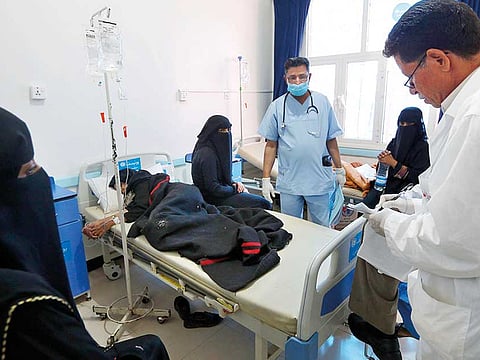Cholera outbreak in Yemen spreads but at a slower speed
Up to 52,000 suspected cases are reported in the country, but the daily number is decreasing

Dubai: More than 470 people have died because of cholera in Yemen and up to 52,000 suspected cases of infection were reported, the World Health Organisation (WHO) has said.
However, the WHO downgraded fears of a wide outbreak of cholera in Yemen, saying there was “a significant decrease” in the daily average number of cases recorded in the week ending on May 27, compared to the previous seven days.
Yemen, which has declared a state of emergency in Sana’a, has warned earlier that up to 300,000 cases could be reported in Yemen in the next six months if no urgent action was taken.
Media reports quoted Dr Omar Saleh, emergency health coordinator at the WHO’s Yemen Office, as saying the sanitary conditions in Yemen are very severe.
“The first round of epidemic happened in October last year, and was controlled in February this year. In four months, there have been about 26,000 cases. This round of epidemic outbreak started on April 27. The number of cases surpassed 38,000 by May 24,” Saleh said.
According to WHO, 7.6 million people live in areas affected by cholera and diarrhoea, and more than 33 million people are at certain risk.
The health organisation noted that cholera needs significant provision in terms of improving sanitation and water treatment and sterilisation.
In a statement, the United Nations Population Fund (UNFPA) has specified that about 2,000 suspected cases are reported daily. “The recent and unprecedented cholera outbreak in Yemen threatens the lives of 1.1 million malnourished pregnant women who need immediate care and reproductive health services,” it said.
Last week, the UAE provided urgent medical aid to the Southern Yemen provinces to stop the spread of the disease.
The Emirates Red Crescent Authority initiated the first phase of the aid programme. It provided the affected provinces in Yemen with vaccines against cholera, while medical fleets have been sent with medicines.
— Aya Sadeq is an intern at Gulf News
Sign up for the Daily Briefing
Get the latest news and updates straight to your inbox



